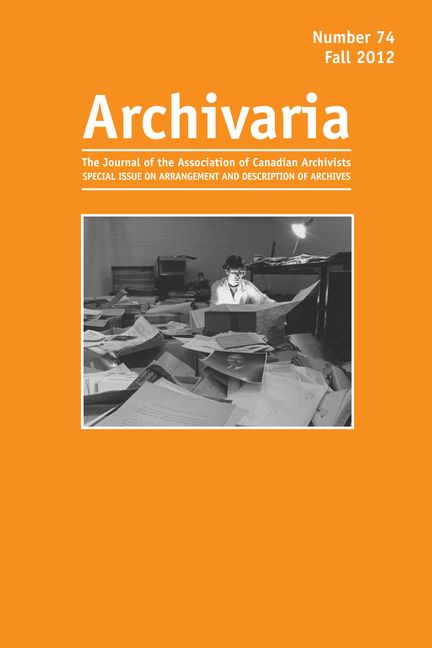"Bad and Dangerous Work": Lessons from Nineteenth- and Early-Twentieth-Century Oxford Archives
Abstract
From the 1860s, Oxford colleges invited external scholars to catalogue their muniments. By looking at how eight colleges’ archives were arranged and described between 1860 and 1930, and by comparing them with the Dutch Manual and Jenkinson’s Manual, both published in this period, together with some earlier cataloguing work from eighteenth-century Oxford, this paper will show that a preoccupation not only with making the archives accessible but also with making particular records instantly available encouraged the archivists to ignore the provenance of records, breaking up fonds and organizing them according to chronology and subject matter rather than maintaining their original order. The consequence was that they treated the records in their care as discrete items, thus prejudicing content over context. The essay will also consider our own attitudes to archival management today, using a brief overview of government policies, archival theory, and online developments to suggest that, once again, we are concentrating solely on access and ignoring provenance. Finally, it will examine several online catalogues to explore whether, like our late-nineteenth- and early-twentieth-century forebears, we too are in danger of putting content before context.
RÉSUMÉ
Depuis les années 1860, des collèges de l’Université Oxford ont invité des spécialistes externes à faire cataloguer leurs titres de propriété. En examinant comment ont été classées et décrites les archives de huit collèges entre 1860 et 1930, en les comparant avec le Manuel néerlandais et celui de Jenkinson, tous les deux parus durant cette période, et en examinant aussi le travail de catalogage effectué à l’Université Oxford au XVIIIe siècle, cet article montre comment la préoccupation de rendre les documents d’archives non seulement accessibles mais aussi disponibles instantanément a encouragé les archivistes à ignorer la provenance des documents, à disperser des fonds d’archives et à organiser les documents selon la chronologie ou le sujet, plutôt que de respecter l’ordre original. Comme conséquence, les archivistes ont traité les documents dont ils avaient la garde comme pièces isolées, favorisant ainsi le contenu plutôt que le contexte. Cet article considère aussi nos propres attitudes envers la gestion des documents d’archives aujourd’hui, en donnant un bref aperçu des politiques gouvernementales, de la théorie archivistique et des développements récents en ligne afin de conclure, qu’encore une fois, nous plaçons l’accent uniquement sur l’accès tout en ignorant la provenance. Enfin, l’article examine plusieurs catalogues disponibles en ligne afin d’explorer si nous aussi, tout comme nos prédécesseurs des XIXe et XXe siècles, nous nous exposons au risque de privilégier le contenu plutôt que le contexte.
Authors of manuscripts accepted for publication retain copyright in their work. They are required to sign the Agreement on Authors' Rights and Responsibilities that permits Archivaria to publish and disseminate the work in print and electronically. In the same agreement, authors are required to confirm that "the material submitted for publication in Archivaria, both in its paper and electronic versions, including reproductions of other works (e.g. photographs, maps, etc.) does not infringe upon any existing copyright." Authors of manuscripts accepted for publication retain copyright in their work and are able to publish their articles in institutional repositories or elsewhere as long as the piece is posted after its original appearance on archivaria.ca. Any reproduction within one year following the date of this agreement requires the permission of the General Editor.





